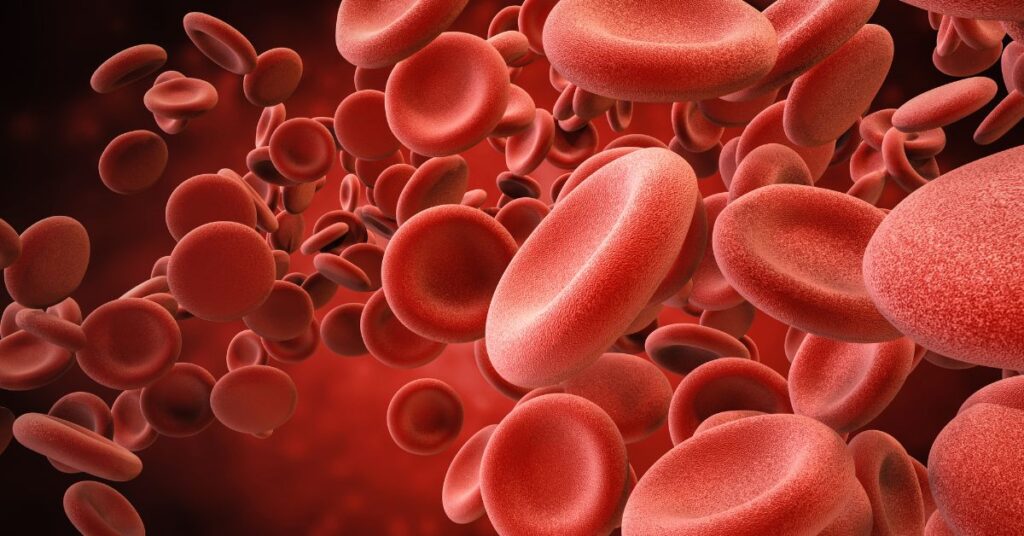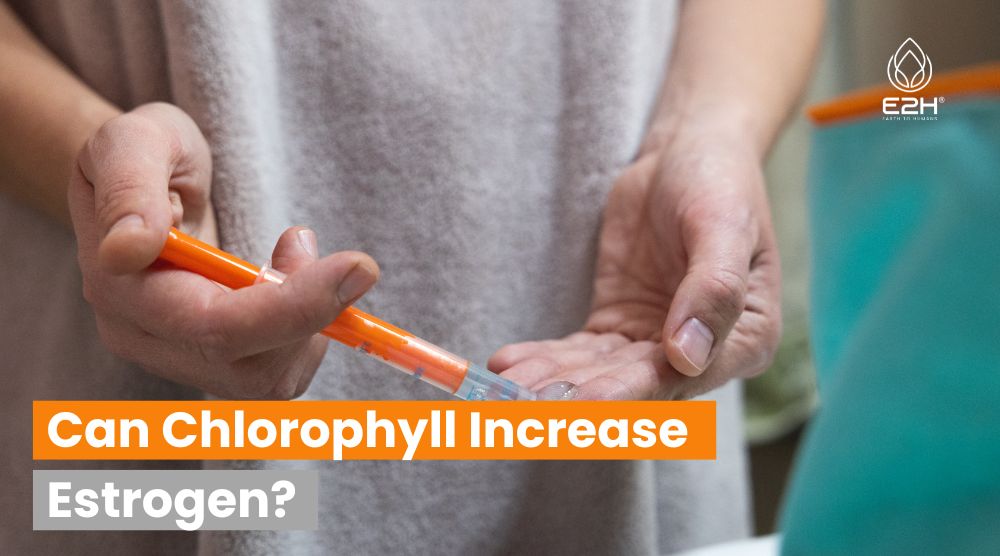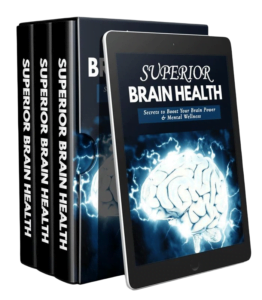Chlorophyll may offer various health and nutritional benefits however, its effects on estrogen levels have not been proven. Therefore, it is not accurate to claim that chlorophyll can increase estrogen.
Understanding Estrogen
Estrogen is a hormone primarily produced in the ovaries in females, but it is also present in males in smaller amounts. It plays a crucial role in regulating the female reproductive system, including the menstrual cycle and pregnancy, and has other functions in the body, such as bone and liver health, and brain function.
What is Chlorophyll?
Chlorophyll is a very much green pigment or color of green pigment is found in plants that the green pigment plays a critical role in photosynthesis. It absorbs light energy from the sun and converts it into chemical energy that can be used by the plant for growth and development. Chlorophyll is also available as a dietary supplement and is known for its potential health benefits.
Can Chlorophyll Increase Estrogen Levels?
There is no scientific evidence to suggest that chlorophyll can increase estrogen levels in healthy cells in the human body. Estrogen is a hormone primarily produced in the ovaries in females, and it plays a critical role in regulating the female reproductive system, including the menstrual cycle and pregnancy, as well as having other functions in the body, such as bone, optimal liver health and brain function.
While chlorophyll has been shown to have various health benefits, including antioxidant and anti-inflammatory properties, its effects on estrogen levels have not been proven. Studies investigating the effects of chlorophyll on hormone levels have focused on animal models and in vitro experiments, and the results have been inconclusive.

It is worth noting that high levels of estrogen in the body can have negative effects, such as an increased risk of certain types of cancer. Therefore, it is important to maintain a balanced level of estrogen in the body, and there is currently no evidence to suggest that chlorophyll can help to regulate estrogen levels.
How Chlorophyll is Absorbed in the Body?
When chlorophyll is consumed through green leafy vegetables or supplements, it is broken down in the digestive tract by enzymes and bile acids. The resulting compounds, called chlorophyllin, are absorbed into the bloodstream through the intestinal wall and transported to the liver, where they are further broken down and excreted.
Some research suggests that chlorophyllin may have potent antioxidant properties and anti-inflammatory effects in the body, although more studies are needed to confirm these potential health benefits further. Overall, while the absorption and metabolism of chlorophyll in the body are relatively well-understood, more research is needed to fully understand its health effects and potential health benefits further.
Chlorophyll and Estrogen: The Link
There is currently no scientific evidence to suggest a direct link between natural chlorophyll and estrogen. While natural chlorophyll itself has been shown to have various health benefits, including antioxidant and anti-inflammatory properties, its effects on hormone levels, including estrogen, have not been conclusively demonstrated in humans.
Some early studies involving animals have suggested that chlorophyllin, a derivative of natural chlorophyll itself, may have estrogenic effects in animals, but more research is needed to determine if these effects are present in humans as well. Therefore, it is not accurate to claim that chlorophyll can increase estrogen levels in the human body without further evidence to support this claim.
Risks and Side Effects of Consuming Chlorophyll Supplements
Chlorophyll supplements are generally considered safe for most people when taken as recommended. However, some individuals may experience mild side effects such as diarrhea, nausea, and stomach cramping. It is also important to note that chlorophyll supplements may interact with certain medications, including blood thinners, and should be avoided by individuals with a history of porphyria, a rare blood disorder.

Additionally, because chlorophyll supplements are not regulated by the FDA, it is important to purchase them from a reputable source and follow the recommended dosage instructions. As with any dietary supplement, it is also important to consult with a healthcare provider before beginning to take chlorophyll supplements, particularly if you have any underlying medical conditions or are taking any medications.
Chlorophyll Benefits: The Top Detoxifying Plant Pigment
Chlorophyll is a powerful plant pigment that has been shown to have various health benefits, including its ability to support detoxification. Chlorophyll helps to bind to toxins and other harmful substances in the body, facilitating their elimination through the liver and kidneys.
In addition to its detoxifying properties, chlorophyll has been shown to have antioxidant, anti-inflammatory, and even immune system-boosting effects in the body. Some research has also suggested that chlorophyll may help to with weight loss reduce bad breath and body odor. While more research is needed to fully understand the potential health benefits of chlorophyll, incorporating green leafy vegetables and other sources of chlorophyll into your diet can be a simple and effective way to support overall health and wellbeing.
The Antioxidant Powers of liquid chlorophyll
Liquid chlorophyll is a powerful antioxidant that helps to to protect healthy cells in the body against oxidative stress and free radical damage. This plant pigment has been shown to help neutralize harmful free radicals in the body, reducing the risk of chronic diseases such as cancer, cardiovascular disease, and neurodegenerative disorders. In addition to its antioxidant properties, liquid chlorophyll also has anti-inflammatory and other immune system-boosting effects, making it a valuable addition to a healthy diet and lifestyle.
What does chlorophyll do to your hormones?
Chlorophyll has been shown to have a number of potential health benefits, but there is limited research on the benefits of chlorophyll that supports its effects on hormones. Some studies have suggested that chlorophyll may have a positive impact on estrogen levels in the body, but more research is needed to fully understand this potential benefit. Overall, while chlorophyll is not known to have a direct impact on hormones, it may still play a role in the immune system, supporting overall health and wellbeing through its antioxidant, anti-inflammatory, and detoxifying properties.
What does health benefits chlorophyll do for females?
Chlorophyll has a range of potential health benefits for both men and women. While more research is needed to fully understand the effects of chlorophyll specifically on females balance hormones and digestive health, some studies have suggested that chlorophyll may have a positive impact on estrogen levels in the body, potentially helping to regulate menstrual cycles and reduce symptoms of premenstrual syndrome (PMS). Additionally, chlorophyll’s antioxidant, anti-inflammatory, and detoxifying properties may support overall female reproductive and digestive health, and wellness.
How do red blood cells contribute to the nourishment of our organs and tissues?
Red blood cells are responsible for replenishing red blood cells and transporting oxygen throughout the body. Hemoglobin, a protein found in red blood cells, binds to oxygen in the lungs and carries it from human blood and through white blood cells to all the organs and tissues of the body, replenishing red blood cells. This ensures that every cell in the body receives the oxygen it needs to function properly.

Without enough red blood cells to transport oxygen, organs and tissues can become starved of oxygen, leading to a range of health problems. Therefore, healthy red blood cells are essential for the proper nourishment and functioning of our organs and tissues.
Does chlorophyll help with menstrual cycle?
Some studies have suggested that chlorophyll may have a positive impact on estrogen levels in the body, potentially helping to regulate menstrual cycles and reduce symptoms of premenstrual syndrome (PMS). However, more research is needed to fully understand the effects and benefits of chlorophyll specifically on menstrual health. Additionally, it is important to note that the benefits of chlorophyll alone should not be used as a substitute for medical treatment or advice, and individuals with menstrual or hormonal concerns should consult with a healthcare professional for guidance.
Why are green vegetables specifically important for maintaining a healthy diet, and what is the role of chlorophyll in this regard?
Green vegetables are important for maintaining a healthy diet because they are rich in essential vitamins, minerals, and fiber that support optimal health and prevent chronic diseases. Chlorophyll, the pigment responsible for the green color of these very green plants and the leafy green vegetables themselves, plays a key role in photosynthesis, the process by which plants convert light into energy. In the body, chlorophyll has been linked to numerous health benefits, including improved digestion, detoxification, and antioxidant activity. Incorporating these green plants and vegetables into your diet can help ensure you are getting these important nutrients and compounds for optimal health.
Can consuming liquid chlorophyll help prevent blood clotting disorders?
While liquid chlorophyll does contain vitamin K, which plays a role in blood clotting, there is no conclusive evidence to suggest that consuming liquid chlorophyll can prevent blood clotting disorders. In fact, individuals with such blood pressure and disorders are typically advised to avoid vitamin K supplements, which can interfere with blood thinning medications.

However, including liquid chlorophyll in a balanced diet may provide other health benefits beyond blood circulation alone, such as antioxidant and anti-inflammatory effects, that can support overall cardiovascular health.
How does chlorophyll benefit people with anemia and thalassemia?
Chlorophyll, which is chemically similar to hemoglobin, may be helpful in treating hemoglobin deficiency disorders, such as anemia and thalassemia. Wheatgrass juice, which is rich in chlorophyll, is believed to help increase the production of red blood cells in the body, thus improving the blood’s oxygen-carrying capacity. Additionally, chlorophyll’s anti-inflammatory and antioxidant properties may help reduce the inflammation associated with anemia and thalassemia. However, further studies are needed to confirm the efficacy of chlorophyll in treating these disorders.
What are some of the antioxidant properties of chlorophyll?
Chlorophyll’s antioxidant properties have anti-inflammatory and antimutagenic effects, which can help to support the immune system and promote healthy aging. By consuming chlorophyll-rich foods or supplements, you can benefit from its potent antioxidant properties and protect your cells from damage. Chlorophyll exerts beneficial effects by acting as a powerful antioxidant. It helps to neutralize free radicals and protect cells from oxidative damage, reducing the risk of chronic diseases such as cancer, heart disease, and Alzheimer’s.
How to Boost Your Estrogen Levels through Food
FAQs
Can consuming foods high in chlorophyll increase estrogen levels?
There is no evidence to suggest that consuming foods high in chlorophyll can directly increase estrogen levels in the body.
Can chlorophyll supplements reduce the risk of breast and colon cancer?
Some studies have suggested that chlorophyll supplements can reduce the risk of colon and liver cancer, breast and colon cancer, but this link to skin cancer and colon and liver cancer itself, is not well established.
Are there any risks associated with consuming chlorophyll supplements?
While chlorophyll is generally considered safe, consuming high doses of chlorophyll supplements can lead to digestive issues and skin sensitivity to sunlight. In addition, chlorophyll supplements may interact with certain medications, so it’s essential to talk to a doctor before taking any supplements.
Conclusion
While there have been claims that a chlorophyll supplement can increase estrogen levels in the body, there is no well-established link between the two. Estrogen levels are primarily regulated by the hypothalamus and pituitary glands, and there is no evidence to suggest that a chlorophyll supplement can directly stimulate the production of estrogen in the body.
While some studies have suggested that chlorophyll can reduce the risk of breast cancer by reducing estrogen levels in the body, further research is needed to confirm these findings. As with any dietary supplement, it’s essential to talk to a doctor before taking chlorophyll supplements and to consume them in moderation to avoid any potential side effects.
His research and writing have been featured in numerous publications, and he is dedicated to helping people understand the importance of these vital nutrients in maintaining optimal health. If you're looking to improve your well-being through diet and nutrition, Christopher is the expert to turn to.
- Can I Take Maca and Ashwagandha Together: YES! - January 7, 2024
- Can You Take Ashwagandha And Liquid Chlorophyll Together: YES! - January 7, 2024
- Can You Take Shilajit and Ashwagandha Together? - January 7, 2024










